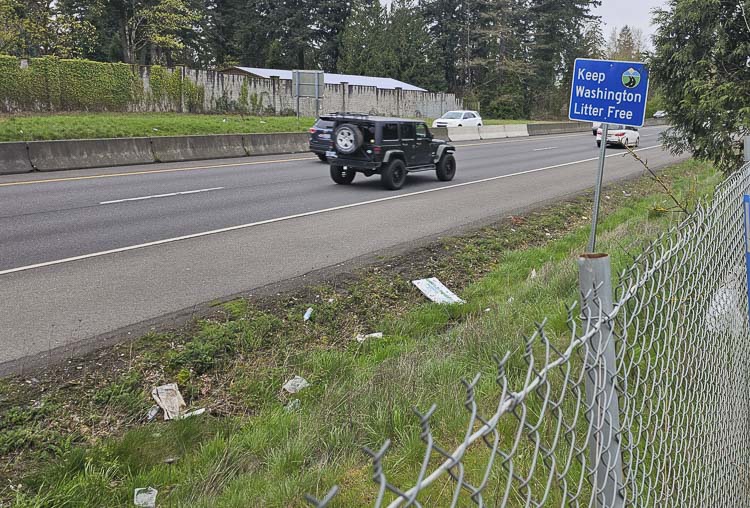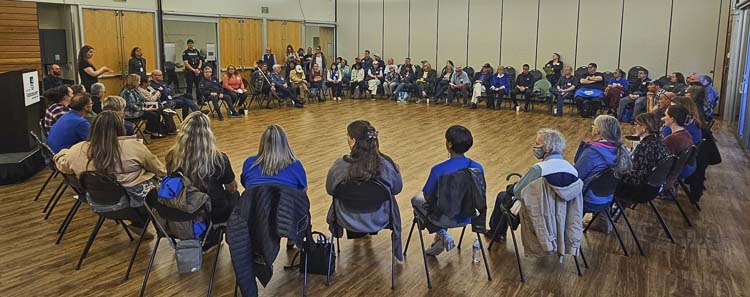
Washington State Department of Transportation says litter cleanup is a ‘complex issue’ dealing with budgets, work crews, and the time of year, but it is working working to reduce roadside garbage
Paul Valencia
ClarkCountyToday.com
A truck driver who has become frustrated at the site of garbage on the sides of local freeways and highways had a question for the mayor of Vancouver on Monday during a community forum.
He asked what the city is doing in regard to cleaning up the litter.
“Sir, who do you think owns that property?” the mayor asked.
She answered her own question.
“The state of Washington.”
She, too, shared her frustration.
“And try as we may, for the last 45 years, we have been contacting (them) … to clean up their freeways. Whether it’s I-5, 205, (state routes) 500, 14, the onramps, the graffiti on their sound walls … Time and time again,” Mayor Anne McEnerny-Ogle said.
“If it’s not between the white lines, it’s low priority,” the mayor added. “Unless it’s a safety hazard in the lane, low priority.”
She even suggested that the truck driver give the Washington State Department of Transportation a call.
“If you make any progress, let me know how you did it,” she said.

Clark County Today took the mayor’s advice and reached out to WSDOT.
It is true that garbage clean-up along the sides of the freeways and highways is a lower priority than debris obstructing lanes of traffic. But it is not as simple as just hiring a crew to pick up garbage. WSDOT is working with a budget, as well.
“Litter cleanup is a complex issue for many reasons, and one of the most significant is funding,” according to an email from Kelly Hanahan, communication manager for WSDOT’s Southwest Region. “Funding for litter cleanup competes in the same bucket of money as other critical maintenance work like repairing guardrails and potholes, striping roadways, maintaining safe rest areas, and responding to weather events including snow and ice conditions. This available budget is already very tight, so that is why litter is so difficult to address.”
WSDOT and the Department of Ecology invest $12 million annually in litter and debris removal statewide, the email noted.
Also, generally speaking, litter is not considered a critical highway safety task unless it is blocking a travel lane. Road maintenance crews remove deceased animals or large items such as mattresses that fall out of unsecured load. If travelers see something that is an immediate safety concern, they are encouraged to call 9-1-1.
Other challenges include creating safe conditions for little cleanup crews. And there are times when specialized crews are needed if biohazardous conditions exist.
Hanahan also said that this is the time of the year when litter looks the worst because crew activity is often paused during the wet winter months.
Statewide, WSDOT expects crews from the departments of Ecology and Corrections to resume in the spring. The WSDOT Southwest Region, however, stopped using crews from Corrections when the Larch Mountain Corrections Center closed in 2023.
There are also 607 volunteer groups, statewide, as part of the Adopt-A-Highway program.
Still, litter is an ongoing problem.
Here are some of ways WSDOT is addressing roadside litter:
Supporting Adopt-a-Highway Volunteers
- Providing training, safety equipment, traffic control gear, litter bags and disposal services for volunteer groups.
- Picking up bags of trash collected by Adopt-a-Highway teams.
- Some highways are not eligible for adoption due to safety concerns, such as narrow shoulders.
- Groups are generally more active in warmer months.
Maximizing efficiency by cleaning areas crews already visit
- When regional maintenance crews are assigned multiple tasks in one area (ex. guardrail and pothole repairs), they may also incorporate shoulder sweeping, litter pickup and graffiti removal in the work zone.
- Contractors and major project teams also integrate cleanup efforts when scheduling allows.
- This approach may require daytime lane closures or occasional short-term full highway closures for safety. We work to balance these ongoing needs with the need to keep people moving and full closures are very disruptive.
Partnering with other cleanup programs
- Ecology Youth Corps (July – August) and Ecology adult crews (March – November) handle additional roadside litter removal. Open positions for these crews are posted online.
- Specialized hazardous waste contractors are hired to assist in litter cleanup following encampment removals, after local jurisdictions post notices and conduct social service outreach.
Note: Look for a story next week on Clark County Today focusing on WSDOT’s advice on how to reduce litter on the highways.
Also read:
- Busy pavement season ahead on Vancouver streetsThe city of Vancouver is set to repave and preserve 76 lane miles across 20 neighborhoods in summer 2025, with ADA upgrades and community notices throughout.
- State representative: Expect sticker shock when Interstate Bridge project officials reveal price, tolling plansAt a town hall in Battle Ground, Rep. John Ley warned of major cost increases and tolling burdens tied to the Interstate Bridge replacement project.
- Opinion: Washington state lawmakers increase the cost of driving – againBob Pishue of Mountain States Policy Center argues that new vehicle and fuel taxes in Washington will raise driving costs while diverting funds away from roads.
- Overnight full closure of I-5 near Woodland for bridge inspection, May 6WSDOT will fully close southbound I-5 near Woodland overnight on Tuesday, May 6 for a bridge inspection using a chain drag test.
- Opinion: Do we still need TriMet?John A. Charles Jr. of the Cascade Policy Institute argues that TriMet should halt expansion plans and prepare for major service reductions in response to falling ridership and rising costs.










A good place to start would be a total ban on illicit squatting and camping on every off-ramp. Mill Plain and 205 is a constant filthy mess because nothing prevents the same vagrants from coming right back in with their stolen shopping carts full of garbage, as soon as the latest WSDOT cleanup crew departs.
Stop playing musical chairs with vagrants, and either force them into the shelter with openings, like the City’s “Safe Rest Villages”, or put them in jail for repeated trespassing. Perhaps 10 days in the cooler will convince them to utilize the “services” they are repeatedly allowed to refuse.
The bottom line here is what we are doing is not working. “Housing First” has been a disaster for years, and its long past time we did something else.
When we moved here seven years ago, the clean, graffiti-free public spaces was a big factor in our decision. I hope that returning to this almost litter-free community will not be stuck in the proverbial “red-tape, their job, not my job” pit.
ahhh, yes…. just another example of how Wash. State (and its cities) are more concerned with gobbling up our tax dollars for never-ending new projects, but not taking care of existing infrastructure.
I’d have no problem whatsoever with stopping all new projects for 1-5 years, with all those monies directed toward maintenance of existing infrastructure. And, yes, I’m thinking of both State and local projects.
TAKE CARE OF WHAT YOU GOT BEFORE YOU ADD MORE TO THE TO-DO LIST.
We have more litter and vandelism today than i’ve ever seen. People toss things out of their windows, vehicles don’t secure loads, kids throw fast food things on the ground all the time, deface benches in the parks and on and on. The state does a good job with what they have to work with so I’m not sure what you are talking about.
The Adopt a Highway is a great program and quite successful when you have committed organizations. In Oregon Hwy 26 to Government Camp and Hwy 35 to Mt Hood Meadows are great examples.
The highways are deplorable- and an embarrassment. The amount of litter from the homeless on the highways, at city intersections where they panhandle, and underpass is deplorable. It seems absurd, but how about pay them a minimal amount when they fill up a bag with their trash. They won’t have to panhandle and would keep their ‘camp’ clean.
Youth offenders used to do community service by picking up trash along roadways. Then adults on supervised work crews. Is this no longer being done? These areas look like a third world country. Embarrassing to show visitors this beautiful area when the trash is so distracting.